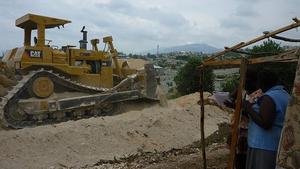 It has been almost four years since Haiti was hit by the 7.0 earthquake which left over 100,000 dead and an estimated 1.5 million people homeless. The 278,000 internally displaced people who currently remain in the tent camps have been living an extremely precarious existence without access to the most basic services; after 2011 the Haitian government and many humanitarian NGOs stopped serving the camps, arguing that to continue doing so would make the camps dependent on aid. Furthermore, the daily lives of the internally displaced have become increasingly difficult, as those in the camps are constantly under the threats of exposure to cholera and forced evictions.
It has been almost four years since Haiti was hit by the 7.0 earthquake which left over 100,000 dead and an estimated 1.5 million people homeless. The 278,000 internally displaced people who currently remain in the tent camps have been living an extremely precarious existence without access to the most basic services; after 2011 the Haitian government and many humanitarian NGOs stopped serving the camps, arguing that to continue doing so would make the camps dependent on aid. Furthermore, the daily lives of the internally displaced have become increasingly difficult, as those in the camps are constantly under the threats of exposure to cholera and forced evictions.
In April 2013, Amnesty International released a report titled Nowhere to Go which revealed that “forced evictions appear to have become an important factor behind the reduction in camp numbers. Amnesty International has documented a pattern of forced evictions of internally displaced families, carried out or condoned by the authorities.” The United Nations Office for the Coordination of Humanitarian Affairs (OCHA) has estimated that over 16,000 households of internally displaced families have been effected by forced evictions since July 2010—affectively becoming homeless once more.
OCHA openly reported in its September 2013 Humanitarian Bulletin that the occurrence of forced evictions were the result of the “violent activities of criminal gangs operating in their neighborhoods”—seemingly independent of the local authorities.
However, the most recent Amnesty International reports contradict those of OCHA, arguing that local authorities have been directly involved in ongoing forced evictions in the community of Canaan, located on the northern outskirts of Port au Prince. The report outlined that “according to residents, police accompanied by armed men arrived and began pulling down their shelters on 31 August. They returned on 4 September with a tractor and continued to tear down their homes. In total, 393 shelters were destroyed. On 18 September the shelters they had managed to rebuild were again destroyed by police and armed men. On each occasion their belongings were stolen, including construction materials and commercial goods. The residents depend on the sale of these goods for their livelihood.” Over the course of the last 18 months, residents have faced at least 10 separate attacks, driving the camp population from 600 families down to 200.
While the government of Michel Martelly has paid lip service to the issue of forced evictions, overall it has maintained a position of indifference, failing to take legal action against those documented for their violent removal of the internally displaced families from their makeshift homes.
For example, on April 15, two individuals seeking to protect their families and neighbours from the threat of forced eviction at Camp Acra, Mèris Civil and Darlin Lexima, were shot at, arrested, and later tortured by police officers at the Delmas 33 station. Civil eventually died at the General Hospital due to his injuries suffered at the hands of the police. The police officers involved have been identified by Haitian human rights lawyers, yet no official sanction has occurred.
The ongoing issue of forced eviction in Haiti highlights the problem with seeking “quick fixes” to the problems related to a top-down post-earthquake reconstruction process. Forced evictions have allowed for the homeless to be pushed out of sight, as it is easier to forcibly breakdown and destroy tents than to propose, administer, and carry out a sustainable and long term national housing program. Indeed the majority of those families who were relocated under Martelly’s internationally backed 16/6 housing plan did not find a new house, but rather little more than a room or a space on the floor. It appears that, in the end, the illusion of clear space in public parks and squares like Champs de Mars was carefully crafted to provide good optics for donors that progress was being made—parks conveniently located along the drive that donors make on the way to stay in one of the many newly built luxury hotels.
*** Amnesty International has launched an Urgent Action appeal, calling on the Haitian government to protect those currently living in the internally displaced camps. Those wishing to lend their support to those at risk from forced eviction can take action here.
Kevin Edmonds is a NACLA blogger focusing on the Caribbean. For more from his blog, "The Other Side of Paradise," visit nacla.org/blog/other-side-paradise. Edmonds is a former NACLA research associate and a current PhD student at the University of Toronto, where he is studying the impact of neoliberalism on the St. Lucian banana trade. Follow him on twitter @kevin_edmonds.

